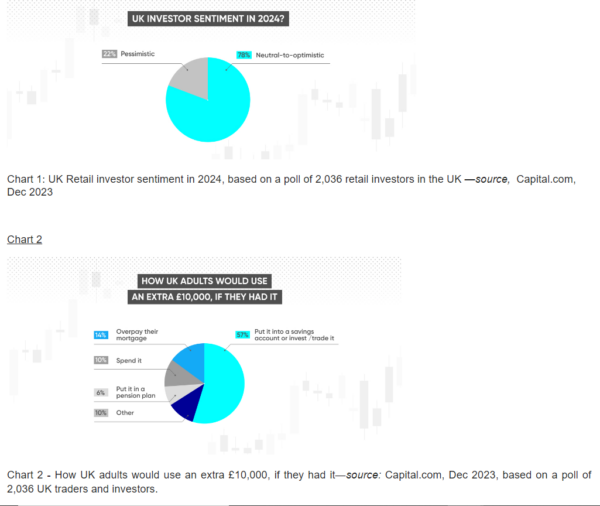Jan
2024
Markets are in the doldrums but retail investors are raring to go
DIY Investor
24 January 2024
Markets are in the doldrums but retail investors are raring to go, new survey finds UK retail investors are bullish on equities but worry about the cost-of-living crisis, falling stock prices and geopolitical risks in the year ahead
Seven in 10 retail (77%) traders and investors in the UK are taking a neutral-to-optimistic view on financial markets in 2024, according to a new nationally representative survey commissioned by online retail trading platform, Capital.com— with 35% of respondents expecting stocks to be the best performing asset class over the next six to 12 months. These findings affirm that market confidence among UK investors remains high, despite wider macro risks.
The findings are based on a nationally representative survey of 19,451 UK adults, of which 2,036 are traders or investors. In this survey, investors and traders are defined as adults who had invested or traded in mutual funds, bonds, forex, commodities, options, CFDs or spread bets in the past 12 months. The survey, commissioned by Capital.com and polled by Find Out Now, was carried out between 21 Nov to 4 Dec 2023.
Commenting on the upbeat investor sentiment revealed by the findings of the survey, Daniela Hathorn, Senior Market Analyst, Capital.com, said:
“Supported by positive economic data at the tail end of 2023, investors are perhaps approaching 2024 with an air of optimism. Yes, there are pockets of weakness in the economy, especially in the UK and the euro area, but global economic growth in 2023 has fared much better than expected. Of course that doesn’t mean the same will happen in 2024, but with investors widely expecting interest rates to fall this year, many expect the recent resilience to be carried through as looser financing conditions make up for some of the loss in productivity and growth.”
The survey further revealed a healthy interest in equity markets, with 35% of respondents expecting stocks to do well in 2024 followed by gold (32%) and oil & gas (31%). Positive market sentiment was further reflected in investors’ capital allocation decisions with 30% of respondents saying they would buy or trade stocks in the next six to 12 months —with the majority focusing on growth and tech stocks (52%). Just 9% said they would move their capital into cash over the same period.
According to Daniela, investors’ preference for stocks over other asset classes in 2024 is likely the result of improving market conditions.
“Stocks are typically favoured by investors because they are considered the ‘most tangible’ of all non-physical investments, which simply means they are easier to measure and understand than other asset classes. Add to that expectations for rate cuts in 2024 and you have the ideal impetus for equity market enthusiasts. With the potential for lower interest rates in 2024, investors are perhaps expecting company valuations to improve making them attractive investments. Tech stocks are renowned for being the market sweethearts as they tend to hold their value even in difficult times, while offering investors greater returns. Similarly, growth stocks can benefit from improved market sentiment and higher valuations.”
Cost-of-living crisis results in greater awareness of savings & investing activities
Despite the market optimism, respondents cited the ongoing cost-of-living crisis as the biggest risk to their investment and trading returns with 22% of those surveyed saying they would need to free up investment capital to cover higher expenses.
Consumers have less money to play with, putting pressure on many to amend their trading, savings and investment habits. When asked what they would do with an extra £10,000, the majority of respondents (57%) said they would either put it into a savings account or trade or invest it. Just 10% said they would spend it while 14% said they would overpay their mortgage or put it into a pension plan (6%).
“The recent period of high inflation has led to a general devaluation of capital unless it was invested in an asset that provided higher returns. It is not surprising that people are more conscious about how they manage their money now that they have seen the cost of living increase exponentially —it is no longer enough to simply save, consumers want to make up for the loss in their purchasing power. This has led to more awareness about investing, leading many to increase their capital allocations to return-generating activities rather than spending,” said Daniela.
Other concerns for UK traders and investors in 2024 include falling stock prices (20%) , geopolitical risk (18%) and recession (16%). Tellingly, only 9% said that higher interest rates were of concern to them, suggesting investors expect the UK economy to improve in the year ahead.
“Markets are currently pricing in between five to six 25 bps rate cuts in 2024 from the BoE. Meanwhile, the central bank itself is expecting to make around three rate cuts this year. These misaligned expectations could drive momentum in UK assets over the coming months, especially as upcoming economic data reveals which set of expectations appear to be correct. Nonetheless, rate cuts are expected so investors may be looking to get higher yields on bonds while they can,” she added.

To find out more, please visit: www.capital.com
Brokers Commentary » Commentary » Equities Commentary » Fixed income Commentary » Latest » Mutual funds Commentary
Leave a Reply
You must be logged in to post a comment.